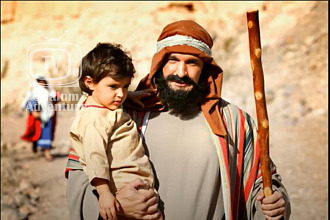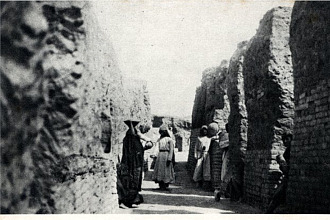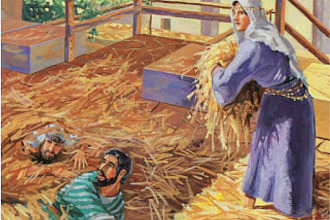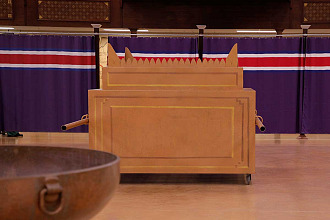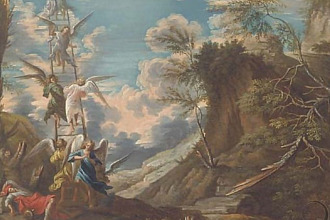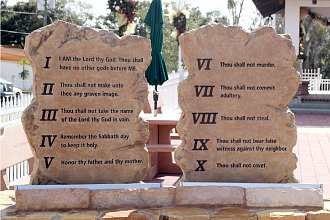Parasha for the Week: Pinchas: Numbers 25:10 - 30:1.
Haftarah: 1 Kings 18:46 - 19:21.
Besorat Yeshua: Mark 6:2 - 13.
Overview
G-d tells Moshe to inform Pinchas that Pinchas will receive G-d's "covenant of peace" as reward for his bold action - executing Zimri and the Midianite princess Kozbi.
G-d tells Moshe to be at enmity with the Midianites who lured the Jewish People to sin.
Moshe and Eleazar are told to count the Jewish People.
The names of the families are listed. The number of men of age to serve in the army is 601,730.
G-d instructs Moshe how to allot the Land of Israel to Bnei Yisrael. The number of the Levites' families is recorded. Tzlofchad's daughters file a claim with Moshe: with no brother, they request their late father's land. Moshe asks G-d, and G-d tells Moshe that their claim is just. The Torah teaches the laws and priorities which determine the order of inheritance.
G-d tells Moshe that he will view the Land of Israel, although Moshe himself will not enter.
Moshe asks G-d to designate the subsequent leader, and G-d selects Yehoshua bin Nun.
Moshe ordains Yehoshua as his successor in the presence of the entire nation.
The Parasha concludes with special teachings of the service in the Beit Hamikdash.
"Bible Centered Leaders"
The Torah states: "the Almighty said unto Moshe, 'Take Yehoshua, the son of Nun, a man in whom is the Spirit and place your hand upon him to designate him as the leader." (Num 27:18) We must do all that we can to strengthen the power of Bible centered leadership. The Almighty - and Moshe - wanted to ensure that the Jewish People had a leader to succeed Moshe who they would follow. Thus Moshe wanted his successor appointed before he died. He also wanted Yehoshua to publicly teach Torah in his presence to demonstrate that Moshe sanctioned and approved of Yehoshua's position. This was a great kindness to both Yehoshua and the Jewish people!
"Patience in Your Bible Studies"
Racing through the Bible in order to read it as fast as possible will lead to a person making many mistakes, or one will miss many insights and concepts that one could gain by a more careful study. The trait necessary for this is patience. The goal is to understand as well as possible. Not only will this trait enable you to concentrate longer on any single idea, but it will also allow you to spend more time reviewing what you have learned. The more you review, the better you will understand and the longer you will remember. When you have been patient and have gained greater comprehension, you will see the benefits of this trait and this will motivate you to continue having this intellectual patience in your Bible studies.
Haftarah: 1 Kings 18:46 - 19:21
Parasha: The Parasha is about Pinchas who killed Zimri and the Midianite princess Kozbi. G-d congratulated Pinchas for his action. The LORD spoke to Moses, saying: "Phinehas son of Eleazar, son of Aaron the priest, has turned back my wrath from the Israelites... Therefore say, 'I hereby grant him my covenant of peace. (Num. 25:10-12).
Haftara: The haftara reminds us of the story of Elijah who did great deeds as Pinchas did. Elijah killed the priests of Baal. "But the hand of the LORD was on Elijah; he girded up his loins and ran in front of Ahab to the entrance of Jezreel. Ahab told Jezebel all that Elijah had done, and how he had killed all the prophets with the sword. (1Kings 18:46-19:1). However, the leadership of Israel at the time of Elijah was not faithful to G-d. The queen wanted to kill Elijah, not reward him. "Then Jezebel sent a messenger to Elijah, saying, "So may the gods do to me, and more also, if I do not make your life like the life of one of them by this time tomorrow." (1Kings 19:2). Then Elijah was afraid; he got up and fled for his life. He himself went a day's journey into the wilderness, and came and sat down under a solitary broom tree. He asked that he might die: "It is enough; now, O LORD, take away my life, for I am no better than my ancestors." (1Kings 19:3-4) Elijah was a great man. He was one who had the privilege of going to heaven without first dying, but he was a human being and became depressed. He slept and during his sleep God spoke to him through an angel: "Then he lay down under the broom tree and fell asleep. Suddenly an angel touched him and said to him, "Get up and eat."" (1Kings 19:5). What a great encouragement for us; the Lord is taking care of us too. From time to time we might think that we alone are faithful to G-d. Elijah had the same feeling, but G-d told him that there was a remnant of 7,000 who also were faithful.
Besorat Yeshua: Matthew 17:1 - 9
This text of the Besorah is the apparition of Moses and Elijah to Yeshua and three of his talmidim, Shim’on, Yohanan, and Yaakov, two thousand years ago. “And after six days Yeshua took with him Peter [Shim'on] and James [Yaakov], and John [Yohanan] his brother, and led them up a high mountain by themselves. And He was transfigured before them, and His face shone like the sun, and His clothes became white as light. And behold, there appeared to them Moses and Elijah, talking with him” (Matthew 17:13).
Every attentive student of the Bible and the truth revealed in the Bible, will think that there is an issue in this text: because according to the Bible “the living know that they will die, but the dead know nothing; they have no further reward, and even the memory of them is forgotten. Their love, their hate and their jealousy have long since vanished; never again will they have a part in anything that happens under the sun.” (Eccl. 9:5-6). Let’s consider carefully the biblical text; it is written that the dead:
1. Know nothing.
2. They have no further reward.
3. Even their memory is forgotten.
4. Their feelings (love, hate, jealousy…) do not exist.
5. They will never appear to any living person.
It is clear here that the person who dies, does not keep a conscience of what happens on the earth, in spite of what mediums say; that is a good news. How can we imagine that our dear ones who already died could be happy in heaven if they are aware of all the misfortunes and miseries of this earth, especially what happens to their own family members and descendants. If they are aware of their suffering, heaven would be hell, not heaven anymore. And according to the Bible, a dead person is not yet in the presence of G-d. Those who believe that the dead are in heaven in the presence of G-d or in hell, have the assumption that human beings are immortal, or at least have an immortal soul. However, the Bible is clear; there is no immortal soul in the Bible. The only one who possesses immortality is G-d who is eternal, “He who is the blessed and only Sovereign, the King of kings and L-rd of L-rds, who alone has immortality, who dwells in unapproachable light, whom no one has ever seen or can see. To Him be honor and eternal dominion. Amen.” (1 Timothy 6:15-16), the L-rd is only one who “has immortality.”
Immortality for G-d’s people, in the Bible, is conditional. The Biblical promise is not “immortality of the soul” but the “resurrection of the dead” at the end, when the Mashiach will come back. This promise was given to the prophet Daniel “As for you, go your way till the end. You will rest, and then at the end of the days you will rise to receive your allotted inheritance.” (Daniel 12:13). It is also affirmed as the 13th principle of Maimonides, which is considered as the profession of faith of Israel together with the Shema’ Israel. Then the question is: how then can Moses, who died on Mount Nebo, appear to Yeshua and speak to Him. The only explanation is that G-d gave a tremendous privilege to Moses, the main and greatest prophet of the Bible, who had the privilege to speak mouth to mouth with G-d. G-d raised up Moses right after his death. It is remarkable to notice that when Moses died, nobody was there to assist him, or to bury him in his tomb: “So Moses the servant of the L-rd died there in the land of Moab, according to the word of the L-rd, and He [G-d] buried him in the valley in the land of Moab opposite Beth-Peor; but no one knows the place of his burial to this day” (Deuteronomy 34:56). Nobody attended the funeral of Moses. And it is exactly what Yehuda, one of Yeshua’s siblings, said in his letter “But even the archangel Michael, when he was disputing with the devil about the body of Moses, did not dare to bring a slanderous accusation against him, but said, ‘The L-rd rebuke you!’ (Jude 9). When the Archangel Michael wanted to raise the body of Moses up and to take it to heaven, Satan (devil) tried to stop him, because Moses sinned, but Michael received his order from G-d, and so he did what G-d asked him to do. Moses was resurrected in the land of Moab, and was taken to heaven by the Archangel Michael. So, it is perfectly right that Moses who was resurrected and Elijah who did not die (2 Kings 2:11) could appear to Yeshua and speak with Him.
I have chosen this text of Matthew, because Jewish scholars have made a parallel between Pinchas, the hero of our parasha, and Elijah. Both of them had the courage to defend the honor of G-d and did a terrible thing: Pinchas against Zimri, an Israelite and the Midianite princess Kozbi who challenged G-d publicly (Numbers 25:6-9) and Elijah against the prophets of Baal (1 kings 18:40).






